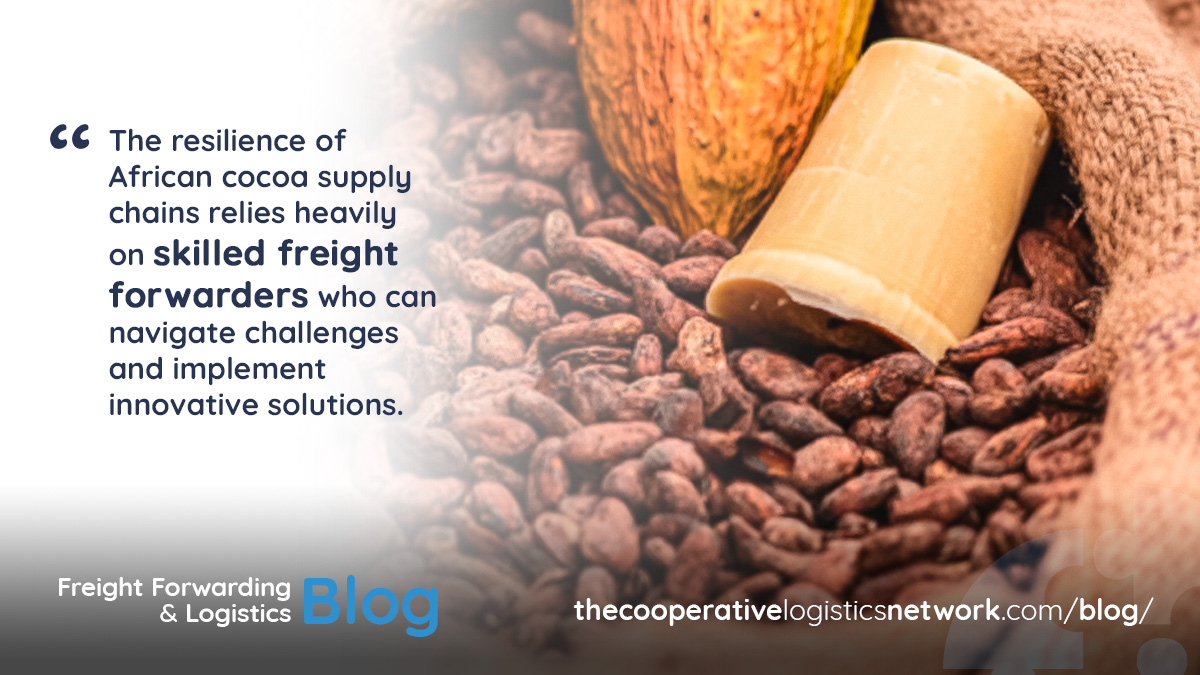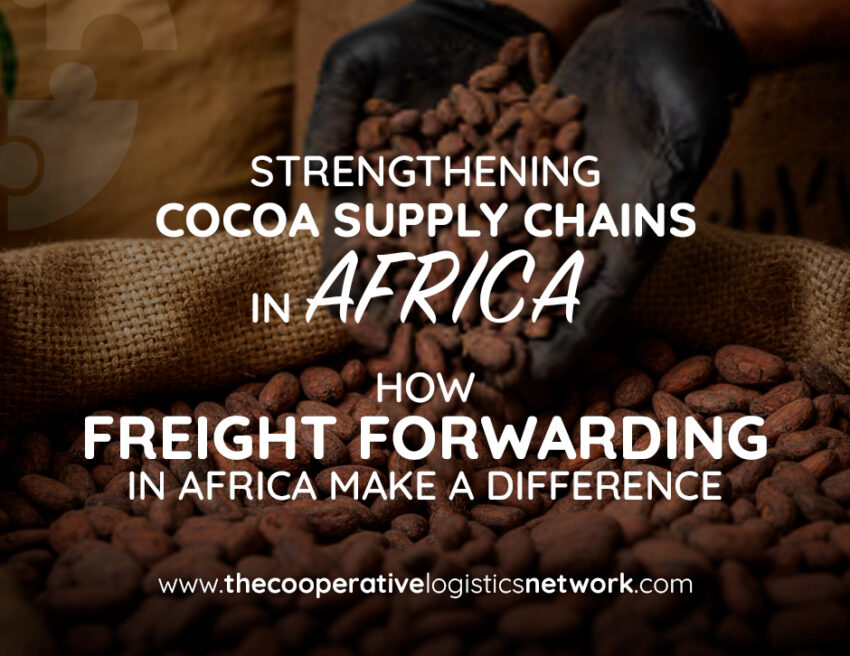Have you ever wondered how cocoa beans harvested in remote regions of Africa arrive safely at chocolate factories around the world? What happens when roads are impassable, ports are congested, or shipments are delayed due to unforeseen circumstances? For African cocoa, the journey from farm to factory is fraught with challenges, and the resilience of the supply chain is critical to ensuring quality, timely delivery, and sustainability.
This is where freight forwarders in Africa play a crucial role. From coordinating shipments to managing warehouses and ensuring timely ocean freight shipping, they act as the backbone of the cocoa supply chain, helping producers and exporters overcome operational hurdles. In this blog, we explore how freight forwarders in Africa strengthen cocoa supply chains, highlighting strategies, tools, and practices that make a tangible difference for producers and buyers alike.

The Challenges Facing African Cocoa Supply Chains
Cocoa is primarily produced in countries such as Ivory Coast, Ghana, Nigeria, Cameroon, and Uganda. While these regions are rich in production, the supply chains face multiple challenges that affect reliability, efficiency, and quality.
Infrastructure Limitations
Many cocoa-growing areas are in remote locations with poor road networks. Rural roads can be difficult to traverse during rainy seasons, slowing down transport from farms to collection points or ports.
Port and Shipping Constraints
Ports in West and Central Africa often face congestion and limited storage capacity. These bottlenecks can disrupt shipments and increase costs, making careful coordination by freight forwarders in Africa essential.
Climate and Environmental Risks
Weather-related disruptions such as heavy rains or flooding can delay harvest collection and transport. Cocoa beans are highly sensitive to moisture, and improper handling or delays can compromise quality.
Fragmented Supply Chains
Cocoa is largely produced by smallholder farmers who rely on intermediaries to transport their beans. This fragmentation makes coordination and quality control challenging.
Economic and Political Instability
Currency fluctuations, changing regulations, and occasional political unrest can introduce uncertainty into the supply chain, increasing the importance of experienced freight forwarders in Africa to manage risks.
How Freight Forwarders in Africa Strengthen Supply Chain Resilience
Efficient Freight Forwarding
Freight forwarders in Africa coordinate shipments from farms to ports and ultimately to international markets. By managing routes, schedules, and cargo consolidation, forwarders reduce delays and maintain quality standards. Ocean freight shipping plays a critical role in ensuring cocoa reaches global buyers on time and in optimal condition.
Multimodal Transport Coordination
Logistics providers integrate road, rail, and sea transport to overcome infrastructure limitations. When roads are impassable, forwarders arrange alternative transport methods to keep shipments moving. This flexibility is key to supply chain resilience.
Risk Management and Contingency Planning
Forwarders assess potential risks such as weather disruptions, port delays, or regulatory changes. By planning contingency routes, arranging insurance, and monitoring cargo in real time, they reduce the impact of unexpected events on cocoa supply chains.
Technology and Digital Tools
Digital platforms allow freight forwarders in Africa to track shipments, manage documentation, and communicate with stakeholders efficiently. These tools enhance transparency, reduce errors, and enable proactive decision-making, which is especially valuable for exporters in countries like Ghana and Ivory Coast.
Case Studies: Freight Forwarders in Africa Making a Difference
Several forwarders have demonstrated how strategic planning and technology adoption improve cocoa supply chain resilience:
-
Integrated Warehousing Solutions: Centralized warehouses near production areas allow faster consolidation and storage of cocoa beans before transport, maintaining quality and reducing transit delays.
-
Digital Tracking Systems: GPS-enabled and IoT-integrated monitoring helps track cocoa shipments in real time, improving transparency and responsiveness.
-
Collaborative Networks: Partnering with local cooperatives in Nigeria, Cameroon, and Uganda ensures efficient collection from smallholder farmers and reduces fragmentation.
These examples show the tangible benefits freight forwarders in Africa bring to cocoa supply chains, enhancing efficiency, reliability, and overall resilience.
Supporting Sustainability and Ethical Practices
Resilient supply chains also focus on sustainability and ethical sourcing. Logistics providers play a role in reducing spoilage, minimizing emissions, and promoting fair trade compliance. Ethical practices are increasingly demanded by buyers in international markets, and forwarders help producers meet these standards while maintaining efficient operations.
Practical Tips for Forwarders and Exporters
To strengthen cocoa supply chain resilience, consider these strategies:
-
Partner with Experienced Freight Forwarders in Africa: Choose providers with proven expertise in managing cocoa shipments across key countries such as Ivory Coast, Ghana, Nigeria, Cameroon, and Uganda.
-
Leverage Technology: Use digital tracking, documentation platforms, and supply chain management tools to improve visibility and reduce errors.
-
Plan for Contingencies: Identify potential risks in transport routes and ports, and prepare backup plans for disruptions.
-
Collaborate with Local Stakeholders: Work closely with cooperatives, farmers, and port authorities for smoother operations and consistent supply.
-
Focus on Sustainability: Incorporate environmentally friendly practices and ensure ethical sourcing compliance.
Conclusion: The Strategic Role of Freight Forwarders in Africa
The resilience of African cocoa supply chains relies heavily on skilled freight forwarders in Africa who can navigate infrastructure challenges, manage risks, and implement innovative solutions. From coordinating multimodal transport and managing ocean freight shipping to leveraging digital tools and supporting ethical practices, these forwarders are essential in ensuring that cocoa beans reach international markets efficiently and safely.
For exporters and buyers, partnering with experienced logistics providers is a strategic advantage that strengthens supply chain reliability, reduces operational risks, and supports sustainable growth across key cocoa-producing countries. By understanding the pivotal role of freight forwarders in Africa, stakeholders can ensure that African cocoa continues to meet global demand, maintain quality, and drive economic value in the region.


